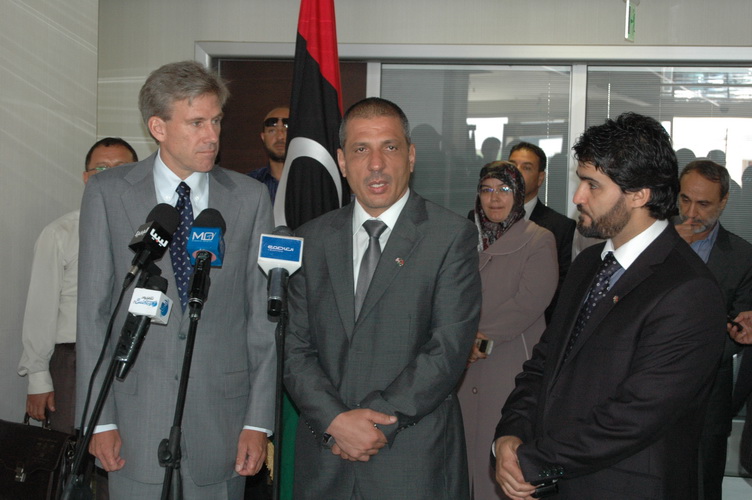
Tripoli, 25 July:
It is reported in Misrata that the chairman of Misrata Local Council (MLC), Yusef Ben Yusef, and vice chairman Mohamed Al-Jamal have submitted their resignations and that Mohamed Ahmed Sualim, a councillor for the city’s Al-Ghiran district, will act as interim leader until fresh elections for the two posts can be organised. They are said to have submitted their resignations at a meeting of the council yesterday and were due to formally resign live on Misrata TV at 11:30 this evening.
The resignations have not been confirmed and this is not the first time the two are said to have resigned.
The two reportedly offered to stand down at a council meeting on 21 June, following calls by other council members on them to go.
Councillors complained at the time that Ben Yusuf and Jamal had failed to resolve Misrata’s problems and were unable to manage its affairs properly. In particular, they highlighted the lack of action rebuilding the city, compensating people who had lost homes or livelihoods as a result of the fighting during the revolution and that they were doing little to help injured revolutionaries.
In the event, the two then withdrew the offer the next day. The issue was then postponed till after the national elections.
Although pressure on the two to resign was led by a number of councillors, there has been strong current of local public discontent directed at them. “People have not been happy with the ways things are run,” said Abdurrahman Sewehli, leader of the Union for Homeland (UFH) party which has a strong base in the city and led the party list vote there in the 7 July elections. “They are very frustrated. There were high expectations when Ben Yusef was elected.”
The honeymoon has been brief indeed. Because of the prominent role Ben Yusef played last year when he returned from Dubai, with medicines, food and other supplies, and his financial support for the war effort, he was extremely popular when elected MLC chairman on 25 February, just five days after Misrata elected its first new council for decades.
Al-Jamal too was well respected for his role during the revolution and was viewed as highly capable.
But this is not simply a classic case of people not being able to make the transition from wartime military commanders to peacetime political leaders.
The root problem, says Sewehli, has been that the council has no money and no authority over local education, public works or anything that would significantly improve the lives of ordinary Misratans. These remain in the hands of the government.
“The council is stuck with no money. All it does it have meetings,” Sewehli said. Nor does he blame Ben Yusef for the high expectations five months ago. “To be fair they were much higher than could be achieved by anyone.”
“The council has been given no money by the government or the NTC”, similarly complains Dr Mohamed El-Fortia, a former director of Misrata hospital, who is involved in working with wounded revolutionaries. “It has no budget. It has not been able to do anything.”
Ben Yusuf’s reporetd replacement, former brigade commander Mohamed Ahmed Sualim, has Sewehli’s full support.
“He is very capable and has extremely good relations with the revolutionaries.” Unlike other former military leaders who have found the switch to democratic political life difficult, “he is learning fast” he says. Just three months ago, Sualim was a very different operator. “He listens”, the UFH leader said. [/restrict]




